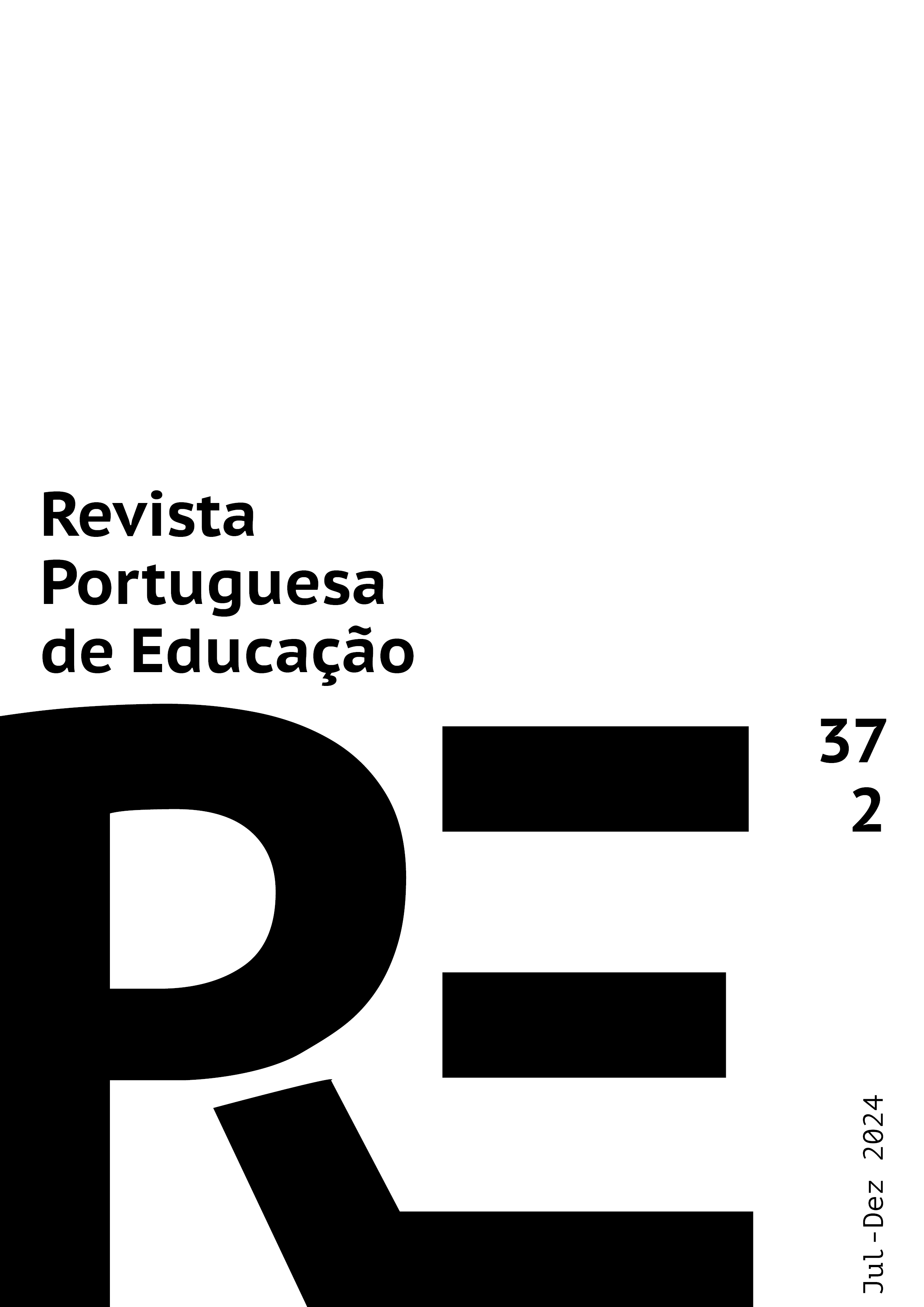Hermeneutics and formative processes: Elements for a pedagogy of choice
DOI:
https://doi.org/10.21814/rpe.28060Keywords:
Hermeneutics, Formative Processes, Philosophy of Education, Aesthetic Experience, Pedagogy of ChoiceAbstract
This article deals, within the scope of the philosophy of education, with the relationship between hermeneutics and formative processes, based on the principle that these processes involve both logical-rational-objective knowledge and the knowledge of experience, understood by the ancient Greeks as máthema and pathei matos respectively. Hermeneutics is defined as a philosophy of interpretation that focuses on the historical and linguistic condition of human experience of the world, therefore, in addition to texts themselves, it also deals with artistic manifestations and phenomena of reality, in search of understanding their meanings. This understanding operates as a translation within the language, so that interpreting is the same as knowing, and understanding a meaning is the same as translating it. The theoretical-methodological framework relies on contributions from Nietzsche, Gadamer, Ricoeur, Rorty and Vattimo, in a bibliographic and exploratory approach that starts from the evolution of the hermeneutics concept to discuss its implications in contemporary formative processes in the dimension of aesthetic experience and pedagogy of choice. The results show that the aesthetic experience, achieved through works of art, contributes not only to the understanding of these, but also to the understanding of the meanings of reality and to the long-term education, through which we learn to be what we are.
Downloads
References
Almeida, R. de. (2015a). Antiniilismo: ou a superação do niilismo pela filosofia trágica. Revista de Estudos de Cultura, (03), 75–83. https://periodicos.ufs.br/revec/article/view/4776
Almeida, R. de. (2015b). O mundo, os homens e suas obras: filosofia trágica e pedagogia da escolha. [Tese de Livre-docência publicada]. Universidade de São Paulo. http://doi:10.11606/T.48.2016.tde-15032016-143517
Almeida, R. de (2020). O Imaginário Trágico de Machado de Assis: Elementos para uma pedagogia da escolha. Faculdade de Educação da Universidade de São Paulo. http://dx.doi.org/10.11606/9786550130121
Antunes, C. L. B. (2012). Métrica e Rítmica nas Odes Píticas de Píndaro. [Tese de doutoramento publicada]. Universidade de São Paulo. https://doi.org/10.11606/T.8.2013.tde-26062013-095555
Aristóteles. (2003). Poética (7.ª Ed.). Imprensa Nacional Casa da Moeda.
Assis, M. de. (2008). Contos de Machado de Assis:Filosofia. (Vol. 3, 1.ª Ed). Record.
Bittencourt, R. N. (2010). Estética como fisiologia aplicada em Nietzsche. Viso: Cadernos de Estética Aplicada, 4(8), 121-143. http://doi.org/10.22409/1981-4062/v8i/93
Chauí, M. (2002). Introdução à história da filosofia: Dos pré-socráticos a Aristóteles.(Vol. 1, 2.ª Ed.). Companhia das Letras.
Coleridge, S. T. (2004). Biographia Literaria. Project Gutenberg. http://www.gutenberg.org/ebooks/6081
Dias, R. M. (1991). Nietzsche educador. Scipione.
Ésquilo. (2003). Oréstia: Agamênon, Coéforas, Eumênides. Zahar.
Favaretto, C. F. (2017). Questões contemporâneas: Arte educação e formação. Revista Costuras, 10(21), 125-135. https://doi.org/10.26563/dobras.v10i21.558
Freire, P. (2003) A importância do ato de ler: Em três artigos que se completam. (23.ª Ed.). Editora Cortez.
Gadamer. H. G. (1997). Verdade e método: Traços fundamentais de uma hermenêutica filosófica. Editora Vozes.
Giacoia Jr., O. (2014a). Nietzsche: O humano como memória e como promessa.Editora Vozes.
Giacoia Jr., O. (2014b). Filosofia da cultura e escrita da história: Notas sobre as relações entre os projetos de uma genealogia da cultura em Foucault e Nietzsche. Estudos Nietzsche, 5(1), 3-24. https://periodicos.ufes.br/estudosnietzsche/article/view/40344
Grondin, J. (2006). L’Herméneutique. (8.ª Ed.). PUF.
Guervós, L. E. de S. (2018). O antiniilismo estético e a superação do niilismo. Cadernos Nietzsche, 39(3), 11-29. http://dx.doi.org/10.1590/2316-82422018v3903lesg
Larrosa, J. (2014). Tremores: Escritos sobre experiência. Autêntica.
Marton, S. (1997). Nietzsche e a celebração da vida: a interpretação de Jörg Salaquarda. Cadernos Nietzsche, (2), 05-17. https://periodicos.unifesp.br/index.php/cniet/article/view/7905
Mota, T. (2010). Nietzsche e as perspectivas do perspectivismo. Cadernos Nietzsche, (27), 213-237. https://periodicos.unifesp.br/index.php/cniet/article/view/7780
Nietzsche, F. (1983). Obras Incompletas. (3.ª Ed.,Col. Os Pensadores). Abril Cultural.
Nietzsche, F. (1995). Ecce Homo: Como alguém se torna o que é. Companhia das Letras.
Nietzsche, F. (1998). Genealogia da moral: Uma polêmica. Companhia das Letras.
Nietzsche, F. (1999). O Nascimento da tragédia: Ou Helenismo e Pessimismo. Companhia das Letras.
Nietzsche, F. (2002). Fragmentos finais. Editora Universidade de Brasília, Imprensa Oficial do Estado.
Ricoeur, P. (2008). Interpretação e ideologias. (5.ª Ed.). Francisco Alves.
Rocha, R. (2018). Píndaro: Epinícios e Fragmentos. Kotter.
Rocha, S. P. V. (2006). Tornar-se o que se é: educação como formação, educação como transformação. In C. Feitosa, M. A. Barrenechea, P. Pinheiro (Orgs.), Nietzsche e os gregos: Arte, memória e educação. DP&A Editora.
Rorty, R. (1994). A filosofia e o espelho da natureza. Relume-Dumará.
Rosset, C. (2004). Le Réel : traité de l'idiotie. Les Éditions de Minuit.
Senko, J. (Diretora), Modine, M., & Rackoff, A. (Produtores). (2015). The brainwashing of my dad.. [streaming]. Cinco Dedos Peliculas.
Steiner, G. (2005). Depois de Babel: Questões de linguagem e tradução. Editora da UFPR.
Vattimo, G. (1996). O fim da modernidade: Niilismo e hermenêutica na cultura pós-moderna. Martins Fontes.
Vattimo, G. (1999). Para Além da Interpretação: o significado da hermenêutica para a filosofia. Tempo Brasileiro.
Vattimo, G. (2010). Diálogo com Nietzsche: ensaios 1961-2000. Martins Fontes.
Downloads
Published
How to Cite
Issue
Section
License
Copyright (c) 2024 Rogério de Almeida

This work is licensed under a Creative Commons Attribution-ShareAlike 4.0 International License.
1. The authors preserve their authorship and grant the Portuguese Journal of Education the right to the first publication. The work is licensed under Creative Commons Attribution License that allows sharing the work with the acknowledgment of initial authorship and publication in this Journal.
2. The authors have the right to take additional contracts separately, for non-exclusive distribution of the published version of their work (e.g. to deposit in an institutional repository or as a book chapter), acknowledging the initial authorship and publication in this Journal.
3. The authors have the permission and are stimulated to post their work online (e.g. in an institutional repository or on their personal website). They can do this at any phase of the editorial process, as it may generate productive changes, as well as increase impact and article citation (see The Open Citation Project).
The work is licensed under Attribution-ShareAlike 4.0 International (CC BY-SA 4.0)




















